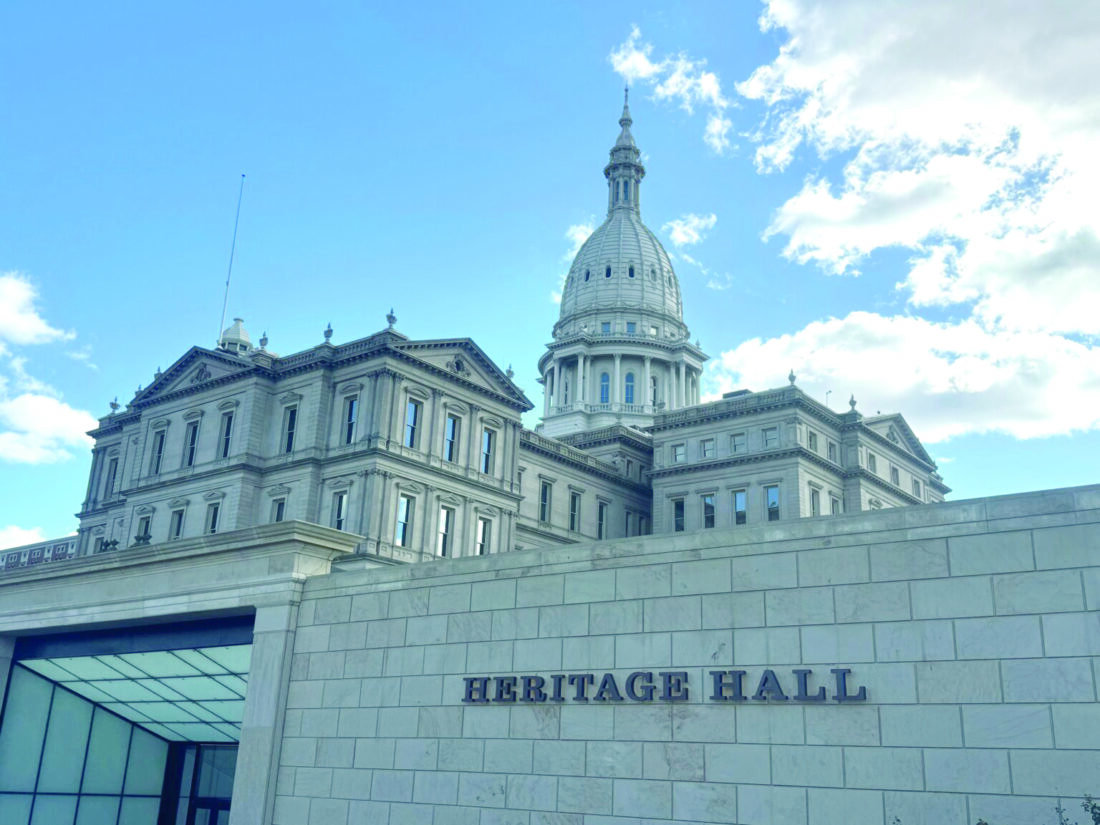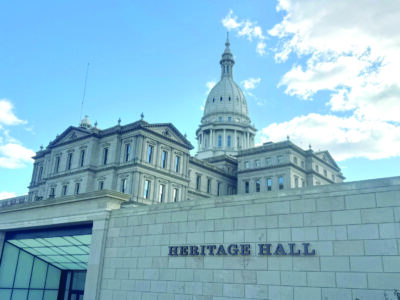Michigan budget crisis averted
Legislature, Whitmer announce deal days before shutdown

The Michigan Capitol building is seen. (Photo courtesy of Susan Demas)
The respective leaders of the Michigan Legislature and Gov. Gretchen Whitmer on Thursday evening announced that they have reached a budget deal just days before the end of the current fiscal year, by proxy avoiding a government shutdown and raising sorely needed money for roads.
The details of the deal are still scarce, but it would include passage of a school aid budget and the state budget on time despite months of uncertainty and political jousting between the Republican-controlled House and the Democratic-controlled Senate, while Whitmer, for the most part, sat on the sidelines until it became apparent that she needed to step in and push things along.
That said, House Speaker Matt Hall, R-Richland Township, said Thursday that the agreement was to a framework and a foundation to move things forward, with the various appropriations subcommittee chairs expected to work Friday and Monday to dig deeper into the numbers and pass the respective budget pieces before Tuesday, the final day of the current fiscal year.
What is known is that the deal includes a long-term road funding deal and melds the top priorities of Democrats and Republicans alike. The Republicans get to do a victory lap because their calls for eliminating “waste, fraud and abuse” and increasing government efficiency would be a part of the final plan. Democrats, on the other hand, get to keep the budget pieces that they have said will help average Michiganders thrive, which might include free school meals – but that has yet to be seen.
Whitmer, for her part, gets to take potentially the biggest victory lap of all, with her finally getting a divided government Legislature agreeing to nearly $2 billion per year to fix local roads. Hall, following House session on Thursday, said that was closer to $1.5 billion to $1.8 billion, but that’s still a start considering Whitmer had to have the state authorize bonds to fix roads during her tenure in the face of past Republican opposition.
“Today’s agreement in the legislature puts us on a path to lower costs, fix the damn roads, and pass a balanced, bipartisan budget by October 1,” Whitmer said in a statement. “I am grateful to Majority Leader Brinks, Speaker Hall, and legislators on both sides of the aisle for working hard to move this budget forward. In Michigan, we’ve proven again and again that we can work together to get things done by staying focused on the kitchen-table issues that make a real difference in people’s lives.”
Whitmer also touched on the burgeoning uncertainty over the national economy under President Donald Trump, saying she was “proud that we are taking action to lower costs, cut taxes for seniors and working families, create jobs, fund schools, fix roads, keep people safe and healthy, and so much more.”
Senate Majority Leader Winnie Brinks (D-Grand Rapids) said the people of Michigan deserve a budget that makes their lives better, one that boosts education, improves roads and protects health care in the state.
“The framework we have agreed to reflects the priorities of Michiganders from every region, and while no budget will be a perfect product, I am confident that the final result we vote on next week will have features that benefit every resident,” Brinks said in a statement.
Hall also said the framework offers an opportunity to reform “Michigan’s broken process and get much better value for the taxpayers.”
“There is still work to be done, but it is an important step that all of us are agreeing to implement meaningful tax relief for Michigan workers and seniors, bring transparency and accountability to the earmark process for the first time, and eliminate ghost employees,” Hall said. “Government has grown far too much in recent years, and we need to trim the waste, fraud and abuse in Lansing. That’s how we can afford the real priorities of Michigan families – like education, public safety, and fixing our local roads and bridges. This agreement puts us in position to do just that.”
Slow pace turns to sprint toward budget action
Earlier this week, the House and Senate showed signs of life in the negotiations and met privately to discuss a solution. Spirits were high in Lansing over the last few days with both sides indicating that progress was being made after months of no progress at all.
When the House met for session Thursday, several pieces of legislation came to the fore that signaled a state budget deal was in the works.
Three bills were moved from committees to the House floor, all aimed at corralling and raising revenue for roads.
Those bills were House Bill 4961, House Bill 4951 and House Bill 4968. Each passed the House on Thursday by wide margins.
The first in that list would let the state “decouple” Michigan and federal business taxes, a move to stave off some of the business tax effects of Trump’s One Big Beautiful Bill Act.
A 24% wholesale marijuana sales tax would be enacted through House Bill 4951, of which the proceeds would pay for road fixes and new builds throughout the state. Cannabis industry leaders have already said they opposed the measure and that it would result in closures of marijuana dispensaries.
The move was estimated to generate nearly $420 million for roads, according to the House Fiscal Agency. In all, it would also create what is being billed as a Comprehensive Road Funding Tax Act, imposing an excise tax specifically for road repairs.
Aged jokes from the early days of Michigan’s interest in creating a statewide regulatory scheme to legalize, tax and sell marijuana products reemerged on social media, with some saying the Legislature finally used pot to fix the state’s potholes.
A fund specifically for locally-owned roads would be created by House Bill 4230, which was passed earlier this year.
The state Department of Health and Human Services would be obligated to seek waivers from the federal Centers for Medicare and Medicaid Services under House Bill 4968, which would let the state keep insurance taxes in the wake of federal changes. Trump’s signature budget bill would disqualify those taxes and affect funding for much-needed federal health care coverage.
Each of those bills were tie-barred to House Bill 4183, Gongwer News Service reported Thursday. That bill passed earlier this year, and would raise the fuel tax from 31 cents per gallon to 51 cents per gallon.
House GOP also takes a victory lap
Hall held a press conference following the adjournment of the respective House and Senate sessions on Thursday. He told reporters that moving the revenue bills were a sign of good faith toward an agreement on how to fund the government, given that both sides got a piece of what they wanted.
For Hall, the main victory for the House GOP was in the area of eliminating “waste, fraud and abuse,” and said the inclusion of cuts to what he’s labeled as “phantom employees” or “ghost jobs” was a major victory. He also claimed it was an acknowledgment from his Democratic colleagues that the issue existed and needed to be dealt with through cuts.
Another push for the House GOP was to create greater transparency in the earmark process, which the chamber installed in its budget proposal passed in August.
“I listened to the Democrats. I talked to our caucus. We made a deal, and what I told them, in this deal, is we will make a deal that includes revenue, but you have to agree to an equal amount of cuts,” Hall said in a short summation of the discourse between Democrats and Republicans this week. “It’s got to be one to one. We’re not going to increase unless you cut waste, fraud and abuse from government. And they, they’re, they’re cutting waste, fraud and abuse from government.”
With that, Hall said the parties have agreed, at least in a working framework, to match cuts and revenue one-for-one. The framework would also dedicate all that money to roads.
Hall, like Whitmer, viewed a solution for roads as a major victory.
“For the first time, really, we’re going to have another roads deal, $1.5 up to $1.8 billion, which is going to go a long way to fixing our roads, and especially our local roads,” he said. “So I’m very pleased with what we’re seeing there.”
The top-line numbers of the school aid fund remain elusive. Hall was asked for greater details on what that budget might look like under the framework, but he said those details need to still be worked out among the subcommittees. He did say it would likely be smaller than the current fiscal year’s allocations for public K-12 schools.
On the incoming marijuana tax, industry leaders are saying that the market was already oversaturated, which would lead to diminishing returns of a 24% wholesale tax rate. They’ve also warned that sales were going to suffer. One reporter noted that the tax would position Michigan as having one of the highest marijuana tax rates in the Midwest.
Hall said that Whitmer herself publicly stated earlier this year that she wanted a 32% wholesale marijuana tax, and that negotiations got that down by 8 percentage points.
“We thought the 32% tax that the Democrats were proposing on marijuana, on the wholesale value, was too much, and we were concerned about how that might affect the industry,” Hall said. “We want to have an industry. The voters have said it’s legal. We have a regulatory framework. I mean, this employs people. It’s an industry in Michigan. … So we reduced it to 24% but ultimately we wanted to dedicate the money to roads. I know that Michigan has among the lowest marijuana prices in the country.”
Although the deal includes new revenue from the marijuana tax, state Sen. Jeff Irwin (D-Ann Arbor) appeared opposed to raising prices for consumers.
“Our low taxes and opportunities for real competition meant that consumers flocked to legal dispensaries,” Irwin said in a social media post. “We learned from California and Colorado that high taxes on cannabis drive people into the illicit market. As a result of our Michigan model, 75% of sales in Michigan happen in legal shops. By contrast, in California, only about 35% of sales happen legally. This is why Michigan’s cannabis market is larger than California’s.”
Irwin said that Republicans jammed through the bill with the intention of funding roads, but said the bill won’t raise the projected revenue and will diminish revenues to roads and schools through the excise tax.
“The real winners in the House today were illicit drug dealers,” Irwin said.
Other stakeholders around the state chimed in on Thursday evening about the tenets of the budget deal.
In a statement, the National Federation of Independent Business said it was disappointed in the decision to pass House Bill 4961, calling the decoupling bill a move that would cause small businesses to lose tax savings on equipment and property that they purchase.
“While we know that this action is due to the unfortunate reality that the Governor and Senate Majority Leader are holding the state budget hostage in order to get additional revenue for roads, we are, nonetheless, dismayed that small businesses got caught in the middle,” said Amanda Fisher, the organization’s Michigan state director. “Unfortunately, the tax savings small businesses experience on their federal taxes will be wiped out when filing their state taxes, as well as making state taxes more confusing.”




